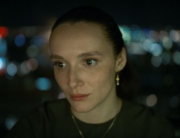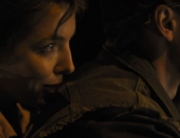A Sicilian Ghost Story is an enigmatic, intriguing, and beautifully made film that isn’t sure quite what it is, or perhaps it isn’t interested in being anything more than intriguing and enigmatic.
Twelve-year-old Luna (Julia Jedlikowska) lives in a small town in the rugged hills of Sicily, and she has a crush on her classmate Giuseppe (Gaetano Fernandez). On the way home from school, she follows him into the woods to ostensibly spy on him. He catches her, and they walk to his home and flirt a bit. He takes her to a stable in the countryside and kisses her. As she waits for him to take his horse back to the stable, he disappears, and she is forced to walk home.
Luna is confused and furious as to why no one in the town seems to care that Giuseppe has now been missing for weeks, and she engages in small acts of rebellion to get her point across: refusing to let another student to sit in Giuseppe’s old seat at school, dying her hair blue, and confronting people on the streets with flyers about Giuseppe’s disappearance. She ends up driving her conservative mother (played with eerie intensity by Sabine Timoteo) up the wall, and she is shunned by the town.
The rest of the film mostly follows Luna’s relentless search for whom she believes to be her true love. She is tenacious and makes a wonderful heroine, and Jedlikowska infuses Luna with a fire born of an adolescent’s complete contempt for unfairness and injustice. She burns through the wobbly narrative like a trail of gunpowder after being lit by a match.
Giuseppe, on the other hand, has his own troubles. Without giving anything away, he has plenty of time to bemoan his fate and does so passively while constantly re-reading a love letter that Luna had given to him just before his disappearance, while hoping someone will remember and rescue him.
There are quite of a few nods to dark fairy tales here. The woods are portrayed as dark and ominous, where even small animals may sneak up behind you and nip at your heels. (Giuseppe, though, is so at peace in the bucolic surroundings that butterflies repeatedly land on his hand.) There are shots of the two teenagers being watched in the woods or chased by dogs and plenty of weird noises on the soundtrack as the camera whooshes through the grass toward our heroine. Luna’s mother is clearly modeled after evil stepmothers, and she gives Luna a heck of a hard time, though she doesn’t quite go as far as poisoning apples. Luna’s basement is, oddly enough, a cavern, and there are glimpses of a lake in the woods and what’s underneath. In fact, there is a strong allusion about the underworld, which, by the end, makes sense, if you know your Greek myths. This almost mystical aspect contrasts with the bright harshness of village life and the treatment and fate of Giuseppe, which is firmly planted in the modern world.
Co-directors and writers Fabio Grassadonia and Antonio Piazza have a wonderful eye and, along with cinematographer Luca Bigazzi, make A Sicilian Ghost Story lovely to look at. What they can’t seem to do is to reconcile their magic realist side with their more realist one when theses two worlds finally collide. The narrative is too grounded in reality to go for a David Lynch, Darren Aronofsky WTF moment or too cynical for the sentimental ending the filmmakers seem to want to give their young lovers, so it ends up like mush. The continual bleakness and hopelessness belie the “love conquers all” message they seem to want to send.
Quite frankly, aside from Luna and her weird mother, everyone else is something of a blank slate or archetype, including Giuseppe. The filmmakers clearly have made a deliberate choice to have the female become the driven, aggressive protagonist and the male the passive, resistant one, without making Giuseppe compelling. Which is indicative of their process: they have stitched together various genres but have simply fallen back on clichés they were attempting to avoid.







Leave A Comment